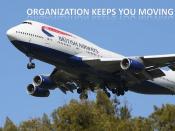Understanding Organisations
Organisation in a mature market is likely to have objectives of moderate growth and the maintenance of its position within the market. McDonald's is an example of such an organisation. You could walk in to a McDonald's restaurant in London, Tokyo or Moscow and expect to see staff dressed in the same uniform serving the same food from within restaurants that look remarkably similar. There are no risks to be taken here and rarely a snap decision to be made and certainly not by the staff.
Contrast this with a small organisation, thirsty for success in an emergent market such as Steve Job's Apple Computers in the early eighties. Here was a company led by a very strong character that was highly motivated, possessed a highly practical imagination and was fanatical about detail. He built up a multinational company on the strength of his ability to promote free thinking coupled with the attention to detail that is required to produce a world class computer within the organisation that he ran.
It is quite clear that if the cultures of these two organisations were transposed there would be internal chaos and the company's would lose their positions within their markets. A McDonald's restaurant that started to add flair to its menu would soon cut in to the company's tightly controlled profit margins whereas a company with tightly enforced rules and regulations could never lead the market in innovative technologies.
It is not by chance that these two organisations have such different cultures. They are each the product of a clearly constructed and executed leadership policies reinforced by the organisation's founders and subsequently their top management. The processes of selection and socialization are key tools in the maintenance of an organisation's culture.
The selection process is typically employed within organisations...


